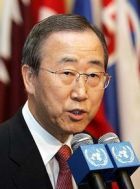UN’s Ban pushes for more time for Darfur plan to work
April 21, 2007 (GENEVA) — U.N. Secretary-General Ban Ki-moon called Saturday on the Security Council to allow more time for diplomacy before considering whether to impose further economic and military sanctions on Sudan over the situation in Darfur.

“There are some members of the Security Council, particularly the United States and the United Kingdom, who have been discussing imposing sanctions against Sudan,” Ban told reporters in Geneva.
“My position is that when the moment of truth comes and we know that they (Sudan) will not be faithful in implementing this commitment, then I will leave it to Security Council members to take the necessary measures against Sudan,” he said.
A series of measures passed by the Security Council already restricts arms shipments to the Sudanese government, the rebels and government-backed janjaweed militias, and the council has imposed further sanctions against specific individuals who defy efforts to bring peace in Darfur.
According to a U.N. report leaked this week, the United Nations panel monitoring existing measures against Sudan has called on the sanctions committee to consider imposing sanctions on more individuals, enhancing the arms embargo, instituting a “no-fly zone” in Darfur and improving the monitoring of any financial freeze or travel ban.
The call came after the committee determined that both the Sudanese government and rebels violated the arms embargo on Darfur.
Senior U.N. officials said on Thursday that Ban made a direct appeal to U.S. President George W. Bush not to impose tough new U.S. sanctions on Khartoum until more time had been allowed for diplomatic negotiations.
More than 200,000 people have been killed in Darfur and 2.5 million driven from their homes since fighting began between ethnically African rebels and the Arab-dominated central government in 2003.
Ban, who is on his first visit to the U.N.’s European headquarters in Geneva since taking office in January, said the next step in resolving the Darfur crisis was the deployment of more than 3,000 U.N. troops, police, and other personnel to strengthen the undermanned and under-equipped AU force there.
A third and final phase to the plan agreed between the U.N. and Sudan in November foresees the deployment of a joint AU-U.N. force with 17,000 troops and 3,000 police officers. Sudanese President Omar al-Bashir has since said he will only allow a larger AU force, with technical and logistical support from the United Nations.
Ban described the situation in Darfur as unacceptable, and said he would expedite the military deployment process at the same time as continuing diplomatic negotiations.
“I am going to concentrate first of all on strictly implementing this second stage and engage in further negotiations with the Sudanese government so that we will be able to deploy United Nations and African Union hybrid peacekeeping operations in Darfur,” he said.
(AP)
